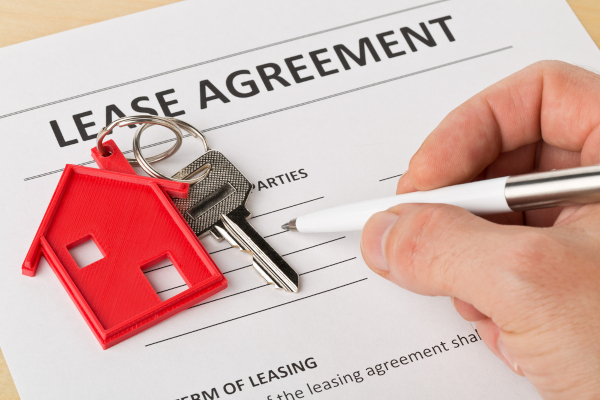The Importance of a Lease Agreement When Leasing A Property
Signing a lease is one of the most important steps in renting out a property. This protects you from any financial burden that may occur. If you fail to have a proper lease agreement, you may even end up as far as giving up your rental investment. Thus, as a landlord, you have to protect yourself and your property by having a lease agreement.
Renting has a specified length of time. A lease agreement determines this time as well as the terms of the lease the tenant and the landlords have agreed upon. The lease agreement also helps set who's going to be responsible for certain events and answers many questions during the rental term. It's always a good idea to review the lease agreement with tenants so they won't have to come back to you if they have questions.
The following are just some of the importance of a lease agreement when leasing a property:

1. Determine Rent Details
Stating the rental fee explicitly will avoid confusion and helps the tenant determine if the property is within the range of their budget or not. It's also good to have a specific time for due dates on rentals, so there will be no delays in payment, and the tenant will have properly prepared their finances for each monthly term.
If you have difficulty drafting an agreement, online resources, like iPropertyManagement, can help you.
2. Clarify Who's Responsible For Repairs
Repairs of the house may happen. If a lightbulb is busted, usually, it'll be the tenant who'll take care of it. However, for major issues, like broken doors and windows, which is already part of the physical property, it should be specifically stated who'll do the maintenance of major repairs.
Most landlords would be responsible for the functional systems of a rental property, such as plumbing, electricity, heat, and air-conditioning, but there has to be a process in place in case tenant needs their assistance.
For example, will the tenant take care of these major repairs and have the money paid back by the landlord, or will the landlord be responsible for the repairs themselves? The lease should also include the time frame when the repairs should start.
These terms are important because a tenant cannot live in a house with repair issues. Repairs must be done immediately because it can get uncomfortable living in the property or even dangerous.
3. Determine Which Utilities Are Covered
Utilities are almost always the responsibility of the tenant. However, there are some lease agreements that include utilities with the monthly rent.
The tenant will have the chance to know which utilities they have to pay for and which ones will get covered with their monthly rent.
It's important to state clearly the utilities that'll be covered. This way, the tenant will know which utility they will have to pay separately for.
4. Specify The Lease Term
The lease term is the length of time a tenant will be staying in a property. This gives them a clear idea that they have to fulfill the contract.
Some lease agreements will state that a tenant has to stay in a property for two years. Tenants will know if this fits their needs because some tenants will only stay in a place for six months.
Tenants can also encounter personal issues and may have to move out earlier than stipulated in the agreement. In this case, it should be determined what the penalties are and if the tenant will be agreeing to be responsible for it.
5. Terms of The Security Deposit
A security deposit, or a damage deposit, protect the landlord. This is a deposit that's paid for by the tenant once the lease starts.
Many landlords will ask for this deposit, and it should be made clear to the tenant when the money will be returned to them and under what conditions. Usually, landlords will only return the deposit once they've fully inspected a property and have seen that it's damage free. Some landlords, on the other hand, will only return the deposit if the rental space has already been cleaned thoroughly.
6. Notification of Events
A tenant has responsibilities to the landlord's property, and this should be stipulated. Every action of the tenant affects the property value and insurance of the property.
For example, if the tenant goes on vacation, it should be stated that they should inform the landlord. You may also find that you'll have a guest or non-tenant stay with you for an extended period of time. The landlord should be informed. If the rental property is unattended, the landlord should know because it can affect insurance policies in case something happens.
Tenants also have a responsibility to the upkeep of the rental property, and it's within the landlord's best interests to be immediately informed if there's any damage to the functional system of the house, such as plumbing and electricity. These issues should be repaired quickly because the damage will spread if it's left untouched.
The tenant should know in the lease agreement if they should inform the landlord if any such issues happen.
7. Conditions For Rent Increases
If a tenant is only going to stay in a property for a short period of time, rent increases won't be an issue. But, renting for a longer period of time can increase the price of the rent.
The lease agreement should specify the percentage which the rent will rise.
8. Know What Types of Pets
Some tenants will have pets, and it's important for a landlord to state explicitly which kinds of pets are allowed in the property. For example, can a tenant keep large breeds of dogs? If possible, the lease agreement should state the type of breeds allowed.
Pets affect the property due to the noise, smell, and mess they make. Pets also potentially bring in allergies, so a landlord should have a stipulation for pets because it affects the living conditions of the other tenants as well as the cleanliness of the property.

Final Thoughts
A property is an investment, and you want to make your property earn money for you. However, renting a property can cause you to lose money if you have tenants that are not aware of lease agreements and do things that are counter to it.
It's important to review the lease agreement with them, so there should be a clear expectation for each party.